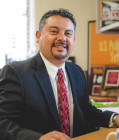Why the Success of Health Reform Depends on Energetic and Nuanced Outreach to Latinos
As the Affordable Care Act goes into full effect, its success depends heavily on how many Latinos sign up to buy new health plans offered through the state exchanges. Latinos are currently the U.S. citizens and residents least likely to have health insurance – so they have the most to gain, especially because public subsidies will help to make new coverage affordable to individuals and families. In addition, Latinos are a relatively youthful segment of the national population, and the new reforms will work only if the young sign up.
How much do Latinos understand about the new options they could gain from health reform? To throw light on this question, Latino Decisions has released two recent surveys, one national in focus and the other looking closely at the Latino community in Colorado. Both studies reveal a significant need for greater outreach to Latinos that is culturally sensitive and specifically tailored for this community. Our data also suggest that Latinos will be receptive: nearly 90% of respondents in the national survey say they are interested in learning more about the new law. Drawing on the national data, this brief sheds some light on important nuances in Latino understandings of the health reform law at this critical rollout stage. Our findings can aid efforts to better inform Latinos about the benefits they could gain in 2014 and beyond.
Some Latinos Know More than Others
In both Latino Decisions surveys, respondents reported that they know little about the Affordable Care Act and find it “confusing” and “complicated.” In the national study, for example, only 12% of respondents described themselves as “very informed” about Affordable Care, while more than half (52%) said they are “not at all” informed or “not that” informed about the law.
Because the Latino population is incredibly diverse, an obvious question is whether levels of knowledge vary in any important ways across segments of the community. There are some differences, but knowledge is lacking across all sub-groups.
- English speaking Latinos are more likely to say they are informed than Spanish speakers, yet fully 42% of Latinos who predominantly communicate in English say they are uninformed.
- Native-born versus foreign-born Latinos show similar patterns. 55% of the native-born say they are either very or somewhat informed, compared to 39% of the foreign-born.
- Not surprisingly, knowledge increases with educational attainment, and college graduates claim to know the most. Even so, fully 39% of Latino college graduates report that they are either “not at all” informed or “not that” informed about the Affordable Care Act.
These results underline that outreach to Latinos must be comprehensive, because even the most highly educated have found it difficult to become well informed about health reform.
Who Can Get the Word Out?
To probe the kinds of approaches that might be most effective for informing Latinos about the health care law, my fellow researchers and I measured the potential effectiveness of various kinds of messengers. We learned that tapping into personal and local social networks is the key.
- A whopping 76% of Latinos report that they will be more likely to enroll in Affordable Care insurance coverage if they are encouraged to take steps by family members and friends.
- Latino doctors are also promising messengers – the next most trusted after family members among the various messengers tested in our survey.
- Another effective set of outreach agents could be Latino teachers, given the trust and respect Latino families have in this group of messengers.
- Not all potential messengers are likely to be effective, however. Less promising messengers include local small business owners, Latino celebrities, and professional athletes. For example, 40% of respondents in the national survey said they would be less likely to enroll if they were approached by Latino actors or musicians.
Our survey results show that officials and civic organizations aiming to boost Latino participation in Affordable Care will have to think carefully about the kinds of spokespersons and messengers they enlist. Celebrities are often assumed to be effective, but in the Latino community, they might actually discourage enrollment in the newly offered health plans.
Messages in English, Spanish – Or Both?
Our results show that 36% of Latinos prefer to hear about the reforms in English, while an equal percentage report that they would like information to be provided in both English and Spanish. Slightly more than one in every four Latinos (27%) wants communications in Spanish. There are some differences among sub-groups, but bilingual messaging is generally important.
- Even among U.S.-born Latinos, 35% say they would like information in both languages.
- The desire for information in English rises among the more highly educated, yet 42% of Latino college graduates nevertheless indicate that they would like information provided bilingually.
- A final clue comes from the intriguing finding in our national survey that 80% of Latino respondents say they are more open to learning about Affordable Care after hearing that the new law could increase the number of health care professionals who speak Spanish.
Findings about language reinforce the bottom line from our research: America’s millions of Latinos have much to gain from health reform, but most do not yet understand how they can benefit. To close the gap, outreach efforts will have to be energetic, culturally sensitive and deeply embedded in the lives of Latino families and communities across the country.
